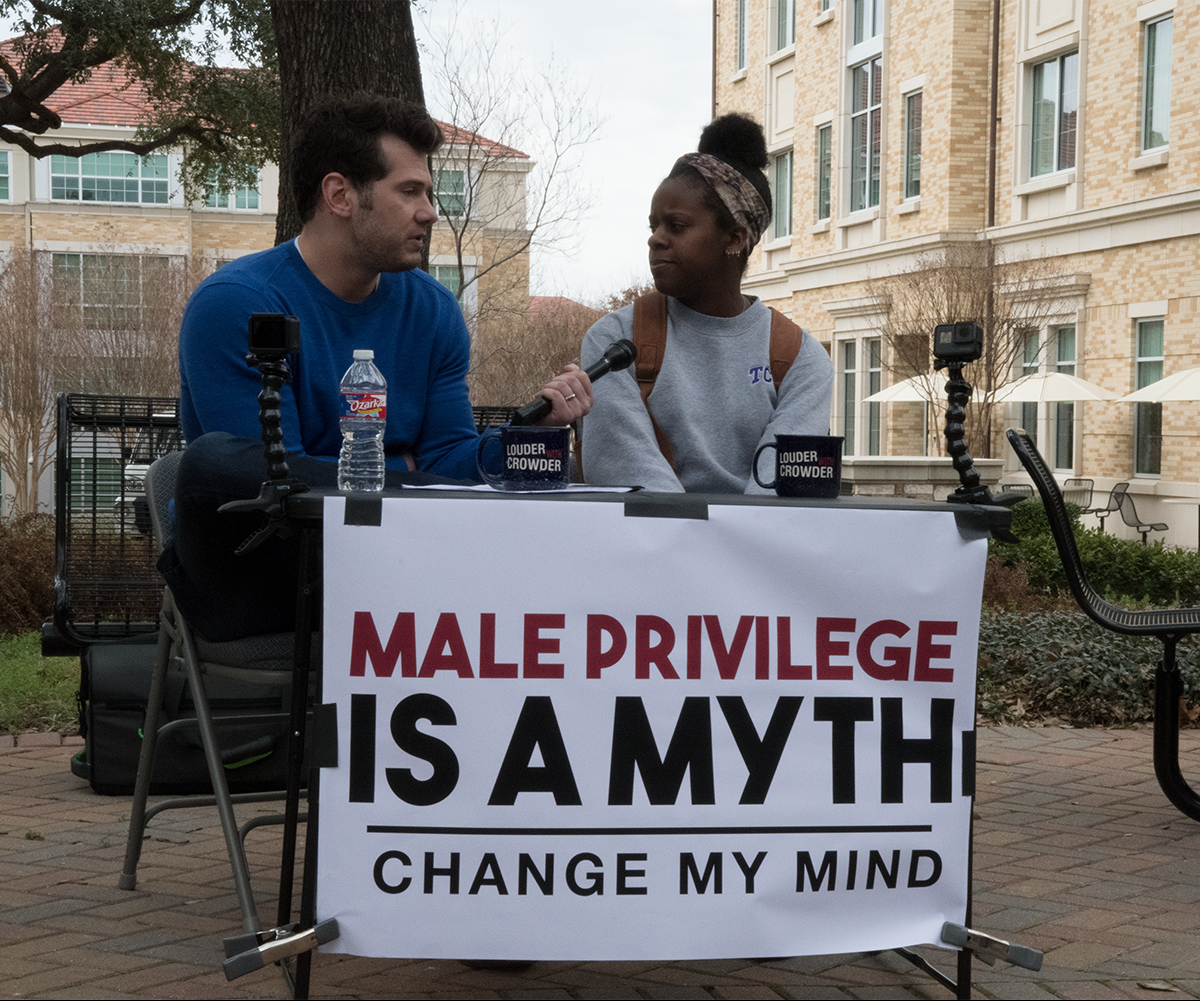You’re probably familiar with the “Change My Mind” meme. It comes from a segment of the same name by conservative YouTuber Steven Crowder, one of the most popular conservative creators on YouTube. Although I don’t agree with anything he says, I was initially drawn to the “Change My Mind” segments because I find political conversations interesting to watch and I do believe it is important for people with different views to talk about their ideas. But as I started watching more of his videos, I realized that they are not intelligent debates, but propaganda that reinforce his fans’ radical positions. Now, I feel ashamed for giving him views on his videos.
Here’s some context if you are unfamiliar with the premise of the segment: Steven Crowder sits at a table with a poster displaying an opinion about some controversial topic, coupled with the phrase “Change My Mind.” In essence, he is asking for people that disagree with the statement to sit down and talk about the issue with him. The conversation is then recorded, allegedly “unedited” and posted on his channel.
He goes to college campuses because student bodies tend to lean more liberal and will have more people that disagree with him. On paper, this doesn’t seem like a terrible idea. Humans often stay in a bubble with people they agree with politically. Many ignore the perspectives of those that they disagree with, which keeps us blind to the possibility of being wrong about something. It is good to facilitate discussion with people who hold different perspectives, but Crowder’s approach leads to an unproductive and harmful environment that merely serves as entertainment for those sick enough to watch him.
For one thing, he consistently makes false claims or puts forth incorrect evidence. He does this constantly during the “Socialism Is Evil: Change My Mind” segment. Crowder and the debater talk about the success of minimum wage, a traditionally “socialist” policy. The debater mentions that Sweden, Norway, Denmark, Finland and Germany are all examples of successful economies that incorporate socialist policies. Crowder responds by saying that those countries “do not have a minimum wage.”
In reality, Germany does have a minimum wage, and while the other countries have no federally set minimum wage, most of their domestic labor forces are unionized, another aspect of socialism. Union leaders can negotiate minimum wages for their members, so most workers in these countries work under a minimum wage. On paper, these countries seem like they have no minimum wages, but after a little investigating, which Crowder clearly did not do, it becomes clear that minimum wages are very much a part of their economy.
In further segments like “America Is Not Racist: Change My Mind,” Crowder claims that the United States has a higher social mobility among its population than any other place in the world. However, according to the World Economic Forum, the United States ranks 27th in terms of social class mobility. Denmark, Norway, Finland and Sweden make up the top four, ironically. Incorrect statements like these imply that Crowder either does not do sufficient research prior to these debates or he knows that he is wrong and just wants to contradict whatever his opponent says. Either one is counterproductive to a political discussion.
But I think the worst of it has to do with his behavior and harassment of the students he is around. In the previously mentioned segment, “Socialism is Evil: Change My Mind,” Crowder regularly interrupts and mocks his opponent. Instead of responding with points, Crowder often asks in a condescending manner for his opponent to guess what his argument is: “I would disagree with that. Now, would you guess where I would disagree with that? Why would I say that.” These are all symptoms of an adversarial argument that Crowder claims to avoid. “Let’s keep things civil!”
On top of Crowder leading an adversarial debate, he also goes to the effort of creating an environment that is biased toward his opinion. First, he has plenty of time to research beforehand and prepare for counterarguments whereas his opponents do not. Furthermore, Crowder only lets one student come up to debate him on the issue, isolating them from any potential support they may have. Crowder intentionally keeps his discussion between himself and one other person, which makes it easier for him to intimidate his debaters, leaving them flustered.
A clear instance of this is during the segment “Build the Wall: Change My Mind.” A group of students stand a short distance away from the billboard, holding posters to protest the prompt. Understandably, these people did not want to engage in the one-on-one arena that was Crowder’s booth. However, Crowder walked over to the students, bringing his supporters with him, and proceeded to interrogate the students as to why they were not participating in the segment.
Change my mind… pic.twitter.com/LQBE4kVZDS
— NFL Memes (@NFL_Memes) September 28, 2020
What really made my blood boil was his incessant attention on one person of color who was clearly under a lot of duress thanks to Crowder’s actions. She made it clear, “I don’t feel comfortable talking to you… I have asked you to leave me alone and you’re not doing that.” Nevertheless, Crowder continued to harass her in a passive-aggressive tone. He should have just stopped talking to her and moved onto another student more comfortable talking to him.
Furthermore, Crowder’s table is often surrounded by followers that support his views. This puts his opponents in a much more stressful environment since they have the potential to be made fun of by not only Crowder, but also by his followers. Just imagine debating someone on a controversial issue in front of a bunch of people that think you are wrong. Lastly, Crowder can select which debates get posted since they are posted on his channel. This creates even more pressure on the debaters to be perfect with their argument because they are almost guaranteed to get harassed by Crowder’s followers on YouTube.
When it comes to political content, the internet is a black hole of news, analysis and entertainment. There are millions of videos from creators with views that completely run the gamut. The nature of politics allows for adversarial content like “Change My Mind” to be so popular on the internet, which allows for random people to be harassed and cyberbullied by Crowder’s followers. The segment may appear to encourage political discourse, but don’t be fooled, for it is just propaganda that fuels Crowder’s followers and their radical views.
















